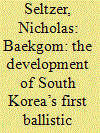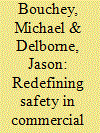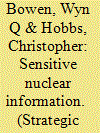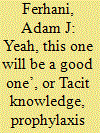|
|
|
Sort Order |
|
|
|
Items / Page
|
|
|
|
|
|
|
| Srl | Item |
| 1 |
ID:
169460


|
|
|
|
|
| Summary/Abstract |
This article traces and analyzes the development of South Korea’s first ballistic-missile system from 1971 through 1978 based on memoirs and personal accounts by scientists and officials directly involved in missile development during this time. The system is often described as a reverse-engineered copy of the Nike Hercules, a US surface-to-air missile, but this description does not capture the true character of South Korean missile development during the 1970s. By working on the Nike Hercules-based design in cooperation with American and French contractors, South Korea’s weapons specialists gained experience and built facilities that underpinned autonomous missile development for decades afterward. The accounts of South Korean weapons scientists also demonstrate that tacit knowledge—subtle or secret methods and tricks transmitted in person from mentors to protégés rather than written down in textbooks or manuals—can play a crucial role in building successful weapons programs and capable research-and-development capacities.
|
|
|
|
|
|
|
|
|
|
|
|
|
|
|
|
| 2 |
ID:
108129


|
|
|
|
|
| Publication |
2011.
|
| Summary/Abstract |
This paper provides an analysis of the relative significance of various methods of acquiring tacit knowledge within the Chinese optical fibre and cable industry. The paper contributes to the definition, understanding and investigation of tacit knowledge using firm-level data in a developing country context, helping to complete a gap in the existing broader literature on technological learning. The research suggests that in industries where tacit knowledge is a more important component of technological learning than codified knowledge, internal R&D activities and domestic peers are important knowledge sources. Additionally, universities are shown to be an important asset in creating learning organisations and provide effective knowledge sources of both tacit and codified knowledge. However, imports of equipment and licensing are a less effective learning channel in the acquisition of tacit foreign technology.
|
|
|
|
|
|
|
|
|
|
|
|
|
|
|
|
| 3 |
ID:
132717


|
|
|
|
|
| Publication |
2014.
|
| Summary/Abstract |
In 2009 President Obama proposed a budget for the National Aeronautics and Space Administration (NASA) that canceled the Constellation program and included the development of commercial crew transportation systems into low Earth orbit. This significant move to shift human spaceflight into the private sector sparked political debate, but much of the discourse has focused on impacts to "safety." Although no one disputes the importance of keeping astronauts safe, strategies for defining safety reveal contrasting visions for the space program and opposing values regarding the privatization of U.S. space exploration. In other words, the debate over commercial control has largely become encoded in arguments over safety. Specifically, proponents of using commercial options for transporting astronauts to the International Space Station (ISS) argue that commercial vehicles would be safe for astronauts, while proponents of NASA control argue that commercial vehicles would be unsafe, or at least not as safe as NASA vehicles. The cost of the spaceflight program, the technical requirements for designing a vehicle, the track record of the launch vehicle, and the experience of the launch provider are all incorporated into what defines safety in human spaceflight. This paper analyzes these contested criteria through conceptual lenses provided by fields of science and technology policy (STP) and science, technology, and society (STS). We ultimately contend that these differences in definition result not merely from ambiguous understandings of safety, but from intentional and strategic choices guided by normative positions on the commercialization of human spaceflight. The debate over safety is better considered a proxy debate for the partisan preferences embedded within the dispute over public or private spaceflight.
|
|
|
|
|
|
|
|
|
|
|
|
|
|
|
|
| 4 |
ID:
129730


|
|
|
|
|
| Publication |
2014.
|
| Summary/Abstract |
This article starts by discussing sensitive nuclear information and how malicious non-state actors could exploit this to facilitate acts of nuclear terror. Our analysis shows that there is a significant information security challenge in this area due to the diversity of sensitive information, the different communities within which it resides and the range of mechanisms by which it could be transferred. We then turn our attention to assessing different steps that could be taken to protect sensitive nuclear information. Here there are limits to the effectiveness of international instruments and national laws and consequently bottom-up initiatives designed to promote responsible self-governance should be developed and supported.
|
|
|
|
|
|
|
|
|
|
|
|
|
|
|
|
| 5 |
ID:
170660


|
|
|
|
|
| Summary/Abstract |
Southeast Asia with its historical concentration of ethnic Chinese remains an important economic hub encouraging cross-disciplinary inquiries on themes relating to businesses. In industrialising Malaysia, there is little research on their capacity to develop tacit knowledge of the founding generation mostly inherited from China, before starting a business in Malaysia. This assessment of four thriving Malaysian Chinese family SMEs in food production evaluates how a new generational change has innovated their traditional food products. Interestingly, tradition may enable these Malaysian Chinese firms to innovate by building on more reliable knowledge and resources, extensively validated over time, and hence reduce development and utilisation costs. The well-trained second and third generations have been innovating tacit knowledge to elicit strong and positive feelings of ‘Chinese’ identity, increasing the value of new products through R&D by embedding past knowledge and facilitating the legitimacy of innovative functionalities and obtaining market acceptance.
|
|
|
|
|
|
|
|
|
|
|
|
|
|
|
|
| 6 |
ID:
188855


|
|
|
|
|
| Summary/Abstract |
Approaching health security from a practice-theoretical perspective, this article advances our understanding of the everyday and locality in health security decisionmaking, and is guided by the following two questions: How is it determined when a health security threat is likely to be present at a point of entry? What knowledge informs everyday health security decisions at borders? Markedly little is known about health security decisionmaking, though conventional wisdom tells us that health security decisions are based on stringent processes and – importantly – anchored in epidemiological knowledge. The assumed primacy of epidemiological knowledge in health security decisionmaking is well illustrated by the SARS-CoV-2 pandemic: evidence-based responses emerged globally following sophisticated epidemiologic investigation. Are health security decisions always rooted in epidemiology? A 12-month period of non-participant observation of Port Health Officers – who, under the auspices of the 2005 International Health Regulations, are responsible for numerous prophylactic measures at the UK border – gives a unique, privileged entry point for understanding the health security decisionmaking process and tells a story that both questions the centrality of epidemiology and foregrounds the role of tacit knowledge and intuition in health security decisionmaking. This article, which draws on insights from the science and technology studies literature on tacit knowledge, shows how observed health risk taxonomies and corollary decisions in prophylactic border security are predicated almost exclusively on hunches and ‘just knowing’ that something ‘doesn’t feel right’.
|
|
|
|
|
|
|
|
|
|
|
|
|
|
|
|
|
|
|
|
|